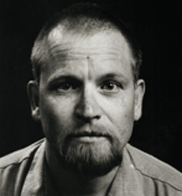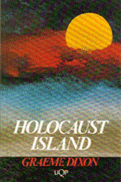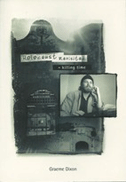Graeme Dixon – September 1 2019
National Child Protection Week (NAPCAN) – September 1-7 2019
 Graeme ‘Bindarri’ Dixon is a Noongar poet, music student and sometime lecturer on Aboriginal history and social justice issues. A member of the Stolen Generations, he lived in children’s homes from the age of three and after being expelled from high school, was in and out of reformatories, ending up in Fremantle Prison where he began writing poetry. After his release, Graeme stayed out of gaol, but fell into problems with alcohol and drugs. He then met and married Sharmaine, who encouraged him to publish his poetry and further his education. At 27, Graeme began tertiary study and later completed a course at Curtin University on politics, communications and Aboriginal Studies. He went on to be part of the 1998 Indigenous judging panel for the Marrwarnging Award at the University of Western Australia. Graeme has written on his life in his contribution to Echoes of the Past: Sister Kate’s Home Revisited. His mother was a Noongar woman from Katanning and his father was an English migrant orphan who grew up at Fairbridge Farm. “Dixon’s unpublished memoirs (2010) Vagabonds and Rogues (Angels and Saints) is … important not only for its insight into prison life but also for the account it makes of the entwinement of child institutionalization and the criminal justice system in Australia. It specifically elucidates the poorly understood connection between the Stolen Generations and Forgotten Australians; the latter a state child welfare system that adversely affected more than 500,000 Australian children, a number of whom were Aboriginal and in some cases the children of Stolen Generations parents (Australian Government Department of Social Services 2015).” – Abstract, The Prison Writing of Graeme Dixon, Lily Hibberd and Glen Stasiuk
Graeme ‘Bindarri’ Dixon is a Noongar poet, music student and sometime lecturer on Aboriginal history and social justice issues. A member of the Stolen Generations, he lived in children’s homes from the age of three and after being expelled from high school, was in and out of reformatories, ending up in Fremantle Prison where he began writing poetry. After his release, Graeme stayed out of gaol, but fell into problems with alcohol and drugs. He then met and married Sharmaine, who encouraged him to publish his poetry and further his education. At 27, Graeme began tertiary study and later completed a course at Curtin University on politics, communications and Aboriginal Studies. He went on to be part of the 1998 Indigenous judging panel for the Marrwarnging Award at the University of Western Australia. Graeme has written on his life in his contribution to Echoes of the Past: Sister Kate’s Home Revisited. His mother was a Noongar woman from Katanning and his father was an English migrant orphan who grew up at Fairbridge Farm. “Dixon’s unpublished memoirs (2010) Vagabonds and Rogues (Angels and Saints) is … important not only for its insight into prison life but also for the account it makes of the entwinement of child institutionalization and the criminal justice system in Australia. It specifically elucidates the poorly understood connection between the Stolen Generations and Forgotten Australians; the latter a state child welfare system that adversely affected more than 500,000 Australian children, a number of whom were Aboriginal and in some cases the children of Stolen Generations parents (Australian Government Department of Social Services 2015).” – Abstract, The Prison Writing of Graeme Dixon, Lily Hibberd and Glen Stasiuk
 Holocaust Island
Holocaust Island
University of Queensland Press, 1990; ISBN 9780702223204
Graeme Dixon’s ballads speak out on contemporary and controversial issues, from Black deaths in custody to the struggles of single mothers. Contrasted with these are poems of spirited humour and sharp satire. In Holocaust Island a powerful new voice emerges from a history of displacement. This dynamic collection of poetry won the inaugural David Unaipon Award for Aboriginal and Torres Strait Islander writers. It forms part of the University of Queensland Press’s Black Australian Writers series, a selection from it being published in the Fresh Cuttings anthology. Contemporary themes such as Aboriginal deaths in custody and land rights are combined with interpretations of the Aboriginal past.

Holocaust Revisited: Killing Time
University of Western Australia Centre for Indigenous History and the Arts, 2003; ISBN 9781740520928
Graeme Dixon’s journey is one that has been made too often by too many Aboriginal people. It is a journey that lies within a legal system that has at its core a lock and key: on doors and windows, in hearts and minds it incarcerates whole communities. Graeme’s poems and stories speak from the heart and they speak from experience, the living voice of Aboriginal prisoners past and present. A personal memoir that pays tribute in prose and poetry to the unsung heroes of Aboriginal experience when in the past many were rounded up and removed from their tribal lands and frequently imprisoned by a colonial society and its heirs that recognised no prior Indigenous title to their own land. It honours their resistance and survival.
